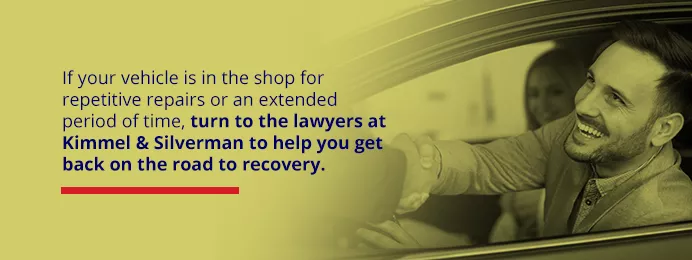
Lemon Law
Attorneys Providing Free Legal Representation
Free Lemon Law Help for Drivers
Driving a Lemon Car? Contact Our Lemon Law Lawyers Today!
Do you think your vehicle might be a lemon? Is it always in the shop for repairs? Does it seem to constantly break down, even after you just had it fixed? If so, you may be driving a lemon, and under State and Federal Laws, you could be entitled to significant compensation.
Best of all, the legal representation is completely cost-free.
The lemon law website is your on-line resource for information on state lemon laws, federal warranty laws, automotive complaints, and car buying issues. If you think you may be driving a lemon car, truck, motorcycle, or ATV, call us at 1-800-LEMON-LAW (1-800-536-6652) today!
What Is the Lemon Law?
The lemon law is a statute that provides recovery to consumers whose vehicles are in the shop repeatedly for the same problem, or a significant amount of time for a variety of issues. Each state’s law is slightly different. Potential remedies under the lemon law include a complete repurchase of your vehicle, a replacement vehicle, or significant compensation to reflect diminished value of your vehicle as a result of your defect.
What Qualifies as a Lemon Car?
A lemon is defined as a vehicle with a continuous impairment to the use, value, and safety. The vehicle must:
- Have a defect that is covered by the manufacturers warranty.
- Have the defect occur within a specified period of time or a specified number of miles as prescribed your state.
- Still not be fixed after reasonable, repetitive repair efforts.
Are Used Cars Covered Under Lemon Law?
Most state lemon laws specifically cover new cars. However, if your used car is covered under a manufacturer’s warranty (original, extended or power-train) and you’ve been back to the shop for repetitive repairs, you still have rights under a Federal Law called the Magnuson-Moss Warranty Act. Representation under the Magnuson-Moss Warranty Act is completely cost-free. You could be looking at significant monetary compensation to reflect the diminished value of the car, plus your warranty remains in effect, and the car is not branded in any way.

Lemon Law Attorneys — Giving You the Protection You Need
When you buy a car, truck, or motorcycle with a manufacturer’s warranty, you expect problems to be fixed efficiently and effectively. If your vehicle is in the shop for repetitive repairs or an extended period of time, turn to the lawyers at Kimmel & Silverman to help you get back on the road to recovery.
You could be covered by your state’s Lemon Law or Federal Warranty Laws if your vehicle suffers from any impairment including but not limited to:
- Check engine lights
- Water Leaks
- Transmission shuddering or jerking
- Electrical issues
- Paint defects
- Airbag lights
- Stalling or loss of power
- Problems shifting into gear
- Error messages
- Bluetooth and Radio issues
- Sunroof problems
Potential outcomes could include:
- A full refund including taxes, tags, and finance charges (minus a small mileage offset as prescribed by your state statute).
- A brand new replacement vehicle.
- Significant monetary compensation to reflect the diminished value of your vehicle as a result of the problem, plus continued ownership of the car.
If You’re Driving a Lemon Car, Truck or Motorcycle, Our Lemon Law Attorneys Are Here to Help
We’ll look into your case free of charge and review your options. If you’re considering hiring a lemon law attorney, it’s helpful to know:
- There is absolutely no legal cost to you, ever. If we prevail, the manufacturer (warrantor) is responsible for all legal fees, costs, compensation, and recovery. If we do not prevail, you owe us nothing. There is no cost and no risk.
- Most claims are resolved promptly, many within weeks or months.
- You could get significant compensation to reflect the reduced value of your vehicle due to the problem. In many cases, you could even get a full refund or replacement vehicle.
- You get to drive your vehicle throughout your claim.
- In most states, you can file a claim regardless if you purchased or leased your vehicle and whether it is used or new. This applies as long as repairs are covered by an original, power-train or extended warranty from the manufacturer.
- Even if you’re not covered by your state’s lemon law, you could still be protected. The Magnuson-Moss Warranty Act is the grandfather of the Lemon Law and provides additional protection to those who may not fall under State Lemon Law parameters.
Nationally Recognized Lemon Law Lawyers
When you are driving a lemon, you need to find a lawyer who is familiar with your state’s Lemon Law and can help you get in the driver’s seat against the billion-dollar automobile manufacturers.
Mr. Silverman: We just wanted to thank you and your staff for the excellent work on our recent case involving our Jeep and FCA. We found everyone at your firm to be very professional, knowledgeable, polite, and helpful during the entire lemon law process. Thanks to Kimmel & Silverman, the "little guy" won!
~ Helen & Jim P. Bloomsburg, PAWhy Use 1-800-LEMON-LAW?
With seven full-service legal offices, 11 experienced attorneys, three ASE-certified automotive experts and a support staff of over 30 paralegals, clerks and administrators, we’ve got the resources, experience and expertise to get you the best outcome for your claim.
We’re proud to say our efforts as an award-winning, nationally recognized Lemon Law firm have been featured in hundreds of media outlets. These include the New York Times, Kiplinger’s Personal Finance, Consumer Reports, Good ‘ Morning America, Nightline and the CBS Early Show.
We also work with the federal and state governments to strengthen consumer legislation and received a Meritorious Recognition award as part of the 2002 Louis M. Brown Award for Legal Access Competition presented by the American Bar Association’s Standing Committee on Delivery of Legal Services.
If you’re driving a lemon, we can help. Make the call to 1-800-LEMON-LAW or contact us online to get free help today.
Find Out How to Get Lemon Law Help in Your State
- Pennsylvania Lemon Law
- New Jersey Lemon Law
- New York Lemon Law
- Ohio Lemon Law
- Texas Lemon Law
- California Lemon Law
Lemon Laws vary from state to state. View our complete list of state lemon laws

